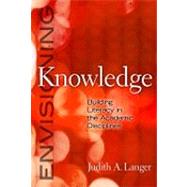
Envisioning Knowledge
by Langer, Judith A.-

This Item Qualifies for Free Shipping!*
*Excludes marketplace orders.
Rent Textbook
Rent Digital
New Textbook
We're Sorry
Sold Out
Used Textbook
We're Sorry
Sold Out
How Marketplace Works:
- This item is offered by an independent seller and not shipped from our warehouse
- Item details like edition and cover design may differ from our description; see seller's comments before ordering.
- Sellers much confirm and ship within two business days; otherwise, the order will be cancelled and refunded.
- Marketplace purchases cannot be returned to eCampus.com. Contact the seller directly for inquiries; if no response within two days, contact customer service.
- Additional shipping costs apply to Marketplace purchases. Review shipping costs at checkout.
Summary
Author Biography
Table of Contents
| Preface | p. xi |
| Envisioning Knowledge: An Introduction | p. 1 |
| Academic Literacy | p. 2 |
| The Growth of Academic Literacy | p. 3 |
| Why Academic Literacy Matters | p. 11 |
| Literate Thinking and Gaining Knowledge | p. 12 |
| Summing Up | p. 14 |
| The Origins of Envisionment Building | p. 16 |
| Envisionment Building | p. 16 |
| Stances During Envisionment Building | p. 21 |
| The Stances as an Instructional Tool | p. 23 |
| Summing Up | p. 27 |
| How We Build Literate Knowledge | p. 28 |
| Orientations Toward Meaning | p. 28 |
| How the Orientations Affect Instruction | p. 30 |
| How the Orientations Relate to One Another | p. 32 |
| Fostering Both Orientations in Disciplinary Classes | p. 36 |
| Summing Up | p. 38 |
| Envisionment-Building Classrooms | p. 39 |
| What Envisionment-Building Classrooms Look Like | p. 41 |
| Features of Minds-On Teaching | p. 43 |
| The Individual Within the Group | p. 51 |
| Summing Up | p. 51 |
| Envisionment Building in Social Studies/History | p. 53 |
| Instructional Foci in Social Studies/History | p. 55 |
| A Minds-On Social Studies/History Class | p. 57 |
| Using the Stances in 8th-Grade Social Studies/History Special Education | p. 67 |
| Online Discussion in a High School World History Class | p. 73 |
| Summing Up | p. 75 |
| Envisionment Building in Science | p. 77 |
| What and How Scientists Know | p. 78 |
| An 8th-Grade Science Class: Sustained Discussion and Writing About Experiments | p. 80 |
| Thinking Critically in a High School Physics Class | p. 88 |
| Summing Up | p. 90 |
| Envisionment Building in Mathematics | p. 92 |
| Learning Mathematics by Engaging in Applied Activities | p. 92 |
| Sustained Discussion and Problem Solving for 12th-Grade Struggling Mathematicians | p. 94 |
| An 8th-Grade Class Developing Math Concepts Through Problem-Based Activities | p. 103 |
| Summing Up | p. 112 |
| Envisionment Building in English | p. 114 |
| Thinking with and Through Language | p. 114 |
| Cognitive and Linguistic Aspects of English Learning | p. 115 |
| How a 9th-Grade English Class Explores Vocabulary and Content | p. 117 |
| Making Literary Comparisons in 12th-Grade English | p. 121 |
| Online Research in a Special Education Class | p. 126 |
| Summing Up | p. 130 |
| Envisionment Building Across Disciplines: Teachers Collaborating in a Professional Community | p. 131 |
| Coming Together | p. 134 |
| Year 1: Developing Problem-Based, Minds-On Activities | p. 135 |
| Year 2: Enhancing Critical Thinking Through Writing | p. 137 |
| Year 3: Learning and Thinking More Deeply in the Disciplines | p. 148 |
| Continuing Self-Study | p. 151 |
| Summing Up | p. 153 |
| Closing the Circle: The Role of Literacy in Disciplinary Knowledge | p. 155 |
| Constructive Envisionment Building | p. 155 |
| Building Knowledge and Gaining Higher Literacy | p. 156 |
| Technology as a Cognitive Playground for Disciplinary Literacy | p. 158 |
| Summing Up | p. 158 |
| References | p. 161 |
| Index | p. 167 |
| About the Author | p. 175 |
| Table of Contents provided by Ingram. All Rights Reserved. |
An electronic version of this book is available through VitalSource.
This book is viewable on PC, Mac, iPhone, iPad, iPod Touch, and most smartphones.
By purchasing, you will be able to view this book online, as well as download it, for the chosen number of days.
Digital License
You are licensing a digital product for a set duration. Durations are set forth in the product description, with "Lifetime" typically meaning five (5) years of online access and permanent download to a supported device. All licenses are non-transferable.
More details can be found here.
A downloadable version of this book is available through the eCampus Reader or compatible Adobe readers.
Applications are available on iOS, Android, PC, Mac, and Windows Mobile platforms.
Please view the compatibility matrix prior to purchase.